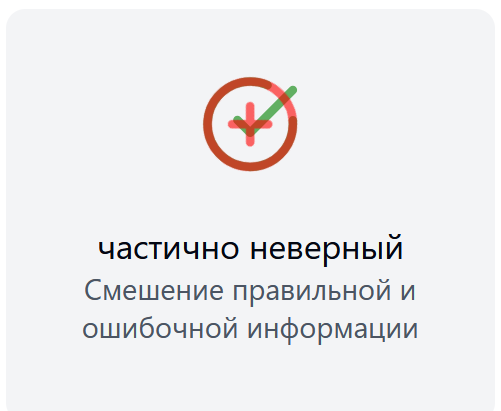On April 22, 2025, a video with the title: “”Germans don’t want to defend their homeland!”” was posted on the YouTube channel CTVBY. This video has already garnered more than 700 thousand views.
With the following content:
Germany’s national security is under threat. The country’s residents don’t want to defend their homeland. According to the Ministry of Defense, the number of applications for exemption from military service has increased almost threefold over the past two years. The army has already reported an acute shortage of personnel. Now it will hardly be possible to fulfill the previously set task of increasing the Bundeswehr’s strength to 203 thousand servicemen by the year 31. Currently, just over 180 thousand people serve in the German army.
Our verdict based on the analyses conducted:
Verdict: Partially incorrect
Reasons:
- There is a mixture of false and correct statements; the ratio of these two is approximately the same.
Full video:
Presence of FIMI indicators
| Criterion | Present in the text? | Explanation |
|---|---|---|
| Intentionality | Yes | Formulations (“don’t want to defend their homeland”, “national security is under threat”) are clearly aimed at changing the perception of reality. |
| Coordination | Presumably | The text has characteristics of a standard narrative often used in influence operations against NATO. However, additional verification of the text’s origin is required for confident assertion. |
| Manipulation of the information environment | Yes | Manipulative generalizations, emotional language, and exaggeration of the threat are used. |
| Strategic goals | Yes | The probable goal is to undermine confidence in Germany’s armed forces and, more broadly, in Western defense structures. |
Typical FIMI elements in the text
-
Emotional escalation: Presenting a normal staffing problem as a threat to national security.
-
False generalization: Transferring the actions of individuals (refusals of service) to the entire population (“country’s residents”).
-
Exaggeration: The growth in the number of refusals is overstated.
-
Undermining trust: Focus on Germany’s inability to achieve military goals.
FIMI text analysis
A – Actor
Presumed actor: Foreign state or non-state entity, possibly linked to Russian influence structures.
Rationale:
-
The text contains narratives characteristic of Russian information operations aimed at undermining confidence in NATO and Western armed forces.
-
The use of generalizations and emotionally charged statements corresponds to tactics described in EEAS reports .fighting-fake-news.eu+6EEAS+6EEAS+6
B – Behavior
Nature of behavior: Manipulative, intentional, and coordinated dissemination of information.
Indicators:
-
Use of exaggerations and generalizations to create a negative image of the situation.
-
Focus on emotional aspects, such as “don’t want to defend their homeland,” to evoke anxiety and distrust.
C – Content
Content type: Combination of factual information with manipulative interpretations.
Examples:
-
The claim of an “almost threefold” increase in service refusals does not correspond to official data, which shows a 7.7-fold increase from 2021 to 2023.
-
The phrase “country’s residents don’t want to defend their homeland” is a generalization not supported by statistical data.
D – Degree of Deception
Assessment: Medium degree of deception.
Rationale:
-
The text contains both credible facts (e.g., the size of the Bundeswehr) and distortions (e.g., exaggeration of the increase in service refusals).
-
The use of facts in combination with manipulations enhances the impact on the audience.
E – Intended Effects
Goals:
-
Undermining confidence in Germany’s armed forces and its ability to ensure national security.
-
Creating a sense of instability and crisis in the country.
-
Fostering a negative attitude towards Germany’s participation in international defense alliances.
The text contains both accurate facts and exaggerations and generalizations. Some claims are supported by official data, others are distorted or not supported by evidence. It is important to critically evaluate such materials and refer to verified sources of information.
Now let’s perform an analysis of disinformation narratives and semantic analysis:
The claim that ‘the country’s residents don’t want to defend their homeland’ may be a distortion of real facts, as no specific data on public opinion is provided, and no sources are cited to support this claim.
lack of verifiable sources
The phrase ‘the country’s residents don’t want to defend their homeland’ creates a division between ‘residents’ and ‘the army,’ which can contribute to polarization of opinions on national security issues.
The content contains factual distortions and manipulations that may lead to misconceptions about the national security situation in Germany.
political situation in Germany
national security
personnel shortage in the army
negative
anxiety
discontent










